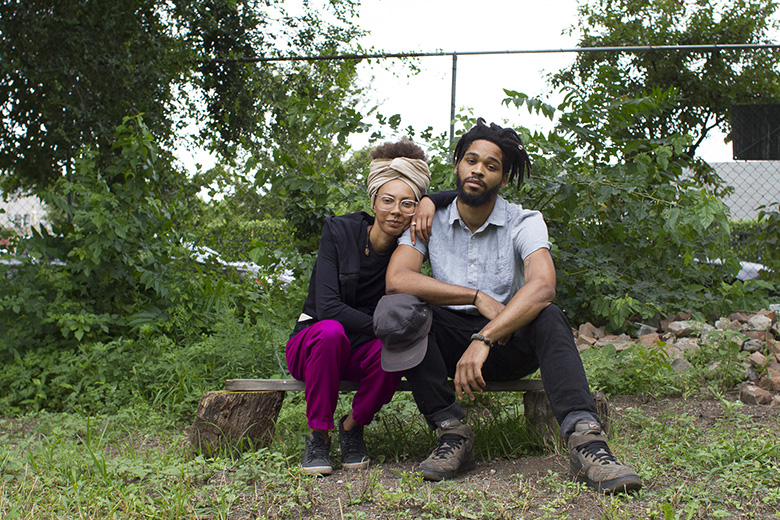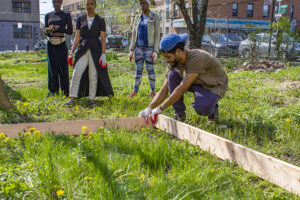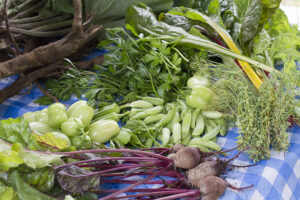
A sprawling garden hugs the corner of the sidewalk where Ralph Avenue and St Marks meet in Crown Heights. An apple tree heavy with fruit overlooks rows of raised beds containing newly planted melons, tomatoes ripening on the vine and long fuzzy okra approaching harvest. Flowering wild herbs cluster along the chain link fence that surrounds the plot where the Tehuti Ma’at Organic Food for the People farming program has been growing steadily the past three years.
The urban garden initiative was founded in 2015 by Priscilla Amado, a 28-year-old multidisciplinary healing artist and educator from the Cabo Verde islands who grew up in Boston, and her partner, Preston Roundtree, a 26-year-old artist and journalist from Alabama with roots in Brooklyn. The couple bonded over a shared passion for organic agriculture and holistic spiritual practices. After spending a year living on the Cabo Verde islands where Amado’s father owns land and runs a farm, they returned to Brooklyn with a deepened appreciation for growing food. Although neither is formally trained in horticulture or permaculture, they wanted to share their hands-on knowledge with others.

Community organizing in Bed-Stuy led them to the Hattie Carthan Community Market (named after an activist relative of Roundtree’s), which inspired them to plant seeds in their own neighborhood. With a grant from the Citizens Committee of New York City, they spent two years clearing out a dilapidated lot that had been inactive for over 30 years. “People have seen the garden transform from the mess that it was into a beautiful space,” Amado tells me over the phone. “They see us having events and growing food. Now, people in the neighborhood are actually coming in.”
In order to expand the garden into a cooperative farm and market, Tehuti Ma’at is collaborating with Just Food, an equity-centered food justice nonprofit based in New York City, for a community-based event and fundraiser this Saturday. Admission to the Organic Food for the People cookout is free and open to the public, and sliding scale donations of $35 to $75 are recommended for those who can afford to give. During the cookout, guests will be able to tour the garden and see the vision for the farm cooperative as well as learn about the legacy of black food freedom through an educational scavenger hunt. The afternoon will include raffle prizes, music and a seasonal vegan menu prepared by Just Food community chefs Chandra Lee, Jeneé Grannum and Mia Richards.
Unlike many community gardens where members rent individual plots for themselves, Organic Food for the People has a model of shared labor and shared resources that extends beyond fruit and vegetable harvests. The garden is entirely volunteer-run and, in warmer months, functions as a meeting place for gardening classes, healing circles and interactive workshops that range from urban foraging and customized natural hair products to plant-based meal prep and pre-colonial African history classes for kids.

Once part of the historic Weeksville neighborhood—a free African-American community in 19th-century Brooklyn that was home to black land-owning farmers, activists and entrepreneurs—the garden plot is part of Amado and Roundtree’s vision of bringing economic empowerment back to the community. According to Amado, the goal of the initiative builds upon the historical legacy of African-American activists who are too often forgotten in their own communities. “For us, it’s about going back to our roots 100 percent,” says Amado.
Practical steps toward economic equity begin with growing affordable produce and “returning to indigenous wild foods” as sources of nourishment and wisdom, Amado explains, but gardening tasks like watering and weeding plants can carry negative connotations because of their ties to enslavement. “It’s been challenging every step of the way,” Amado admits about engaging her neighbors, but the continued presence of garden members has helped gain the trust of the community and reinstate positive images of black people working the land and growing food, symbolizing independence from institutionalized white supremacy instead of being oppressed under it.

The partnership with Just Food, where Amado currently works as a consultant, offers valuable resources and a built-in network to share the word, but the collaboration comes with its own lessons: Niche terms like “food sovereignty” and “food justice” are buzzy within the food advocacy realm, but to Amado’s neighbors in Crown Heights, it’s unfamiliar jargon that feels isolating.
Amado hopes that Saturday’s event will inspire a greater sense of accountability from folks on both sides of the garden fence. “I want people to feel accountable to their communities and to creating collective spaces that people work together to maintain,” says Amado. “And I want people on the outside to support the work of those who don’t have the financial capacity, so we can get the vision where it’s going.”
Photos courtesy of Tehuti Ma’at Community Garden.
Organic Food for the People Cookout will be held on Saturday, September 8, from 2–6 p.m. at the Tehuti Ma’at Community Garden located at 455 Ralph Avenue in Crown Heights.







